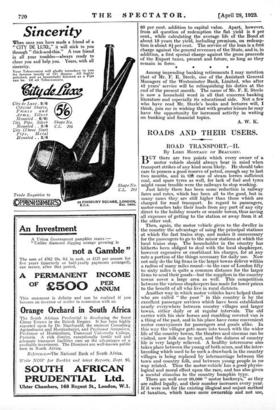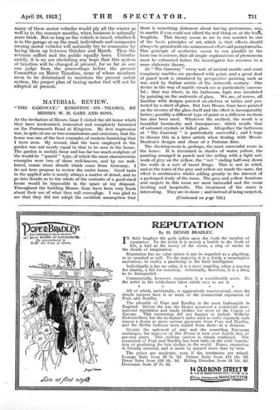ROADS AND THEIR USERS.
ROAD TRANSPORT.-II.
By LORD MONTAGU OF BEAULIEU. BUT there are two points which every owner of a motor vehicle should always bear in mind when transport strikes of any kind seem likely. He should take care to possess a good reserve of petrol, enough say to last two months, and in tilt case of steam lorries sufficient coal, and spare tyres as well, for lack of fuel and tyres might cause trouble were the railways to stop working. Just lately there has been some reduction in railway fares and rates, which has been all to the good, but in many cases they are still higher than those which are charged for road transport. In regard to passengers, motor-coaches take their loads from any part of any city direct to the holiday resorts or seaside towns, thus saving all expenses of getting to the station or away from it at the other end.
Then, again, the motor vehicle gives to the dweller in the country the advantage of using the principal stations at which the fast trains stop, and makes it unnecessary for the passengers to go to the minor stations at which the local trains stop. The householder in the country has hitherto been obliged to deal with the local shopkeeper, however expensive or exorbitant his charges, for at any rate a portion of the things necessary for daily use. Now not only do the big firms in the larger towns deliver within a radius of many miles round—in the case of London fifty to sixty miles is quite a common distance for the larger firms to send their goods—but the suppliers in the country towns cover a large area as well. This competition between the various shopkeepers has made for lower prices to the benefit of all who live in rural districts.
Another way in which motor vehicles have helped those who are called " the poor " in this country is by the excellent passenger services which have been established nearly everywhere between country villages and larger towns, either daily or at regular intervals. The old carrier with his slow horses and rumbling covered van is a thing of the past, and in his place have come convenient motor conveyances for passengers and goods alike. In this way the villager gets more into touch with the wider life of the country towns, the theatres and cinemas can be visited, new folk can be met, and the dulness of country life is very largely relieved. A healthy intercourse also takes place between the young of both sexes, and the inter- breeding which used to be such a drawback in the country villages is being replaced by intermarriage between the town and country folk, and between young people in no way related. Thus the motor-vehicle has a good physio- logical and moral effect upon the race, and has also given a mental stimulus to the country bumpkin type. There are well over 80,000 " motor hackneys," as they are called legally, and their number increases every year. If it were not for the existing illogical and unjust method of taxation, which taxes- mere ownership and not use, many of these motor vehicles would ply all the winter as well as in the summer months, when business is naturally more brisk. But so long as the vehicle is taxed, whether it is in the garage or on the road, individuals and companies owning motor vehicles will naturally try to economize by laying them up between October and March. Thus the revenue suffers and the public equally loses. Unfortu- nately, it is no use cherishing any hope that this system of taxation will be changed at present, for so far as one can judge from the proceedings before the present Committee on Motor Taxation, some of whose members seem to be determined to maintain the present unfair system, the proper plan of taxing motor fuel will not be adopted at present.



















































 Previous page
Previous page